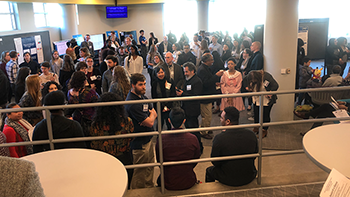Comparing Drinking-Related Harms and Use of Protective Behavioral Strategies Among College Students With and Without Attention-Deficit Hyperactivity Disorder
Description/Abstract/Artist Statement
2-8% of college students in the United States report having Attention-Deficit Hyperactivity Disorder (ADHD). Previous studies revealed that ADHD college students are more likely to binge drink (5+ drinks) and to experience alcohol-related problems (i.e., fail classes) than non-ADHD college students. However, ADHD students may differ from non-ADHD students on their use of protective behavioral strategies (PBS) to reduce negative consequences experienced from drinking (i.e., use a designated driver). This is an area in need of more research. Thus, the aims of the present study were to examine if college students with and without ADHD differed on their: 1.) level of alcohol-related consequences while controlling for typical alcohol use, and 2.) use of PBS while controlling for typical alcohol use. It was hypothesized that students with ADHD would experience more alcohol-related problems and report lower use of PBS compared to non-ADHD students. Participants were 532 (73.1% women; 90.4% without ADHD) college student alcohol users (i.e., consumed alcohol at least once in the past 30 days) between ages 18 to 25. Participants completed anonline survey and were compensated extra credit in psychology courses. Results showed that the two groups didn’t differ significantly on alcohol-related problemscores or use of PBSto minimize harmful drinking. The findings suggest that existing interventions that target PBSmay be useful for college students, regardless of having ADHD. Despite the current null findings, further research remains a need as young adults with ADHD are more likely to experience negative consequences from drinking than their peers.
Faculty Advisor/Mentor
Cathy Lau-Barraco
Presentation Type
Poster
Disciplines
Psychology
Session Title
Poster Session
Location
Learning Commons, Atrium
Start Date
2-8-2020 8:00 AM
End Date
2-8-2020 12:30 PM
Comparing Drinking-Related Harms and Use of Protective Behavioral Strategies Among College Students With and Without Attention-Deficit Hyperactivity Disorder
Learning Commons, Atrium
2-8% of college students in the United States report having Attention-Deficit Hyperactivity Disorder (ADHD). Previous studies revealed that ADHD college students are more likely to binge drink (5+ drinks) and to experience alcohol-related problems (i.e., fail classes) than non-ADHD college students. However, ADHD students may differ from non-ADHD students on their use of protective behavioral strategies (PBS) to reduce negative consequences experienced from drinking (i.e., use a designated driver). This is an area in need of more research. Thus, the aims of the present study were to examine if college students with and without ADHD differed on their: 1.) level of alcohol-related consequences while controlling for typical alcohol use, and 2.) use of PBS while controlling for typical alcohol use. It was hypothesized that students with ADHD would experience more alcohol-related problems and report lower use of PBS compared to non-ADHD students. Participants were 532 (73.1% women; 90.4% without ADHD) college student alcohol users (i.e., consumed alcohol at least once in the past 30 days) between ages 18 to 25. Participants completed anonline survey and were compensated extra credit in psychology courses. Results showed that the two groups didn’t differ significantly on alcohol-related problemscores or use of PBSto minimize harmful drinking. The findings suggest that existing interventions that target PBSmay be useful for college students, regardless of having ADHD. Despite the current null findings, further research remains a need as young adults with ADHD are more likely to experience negative consequences from drinking than their peers.


